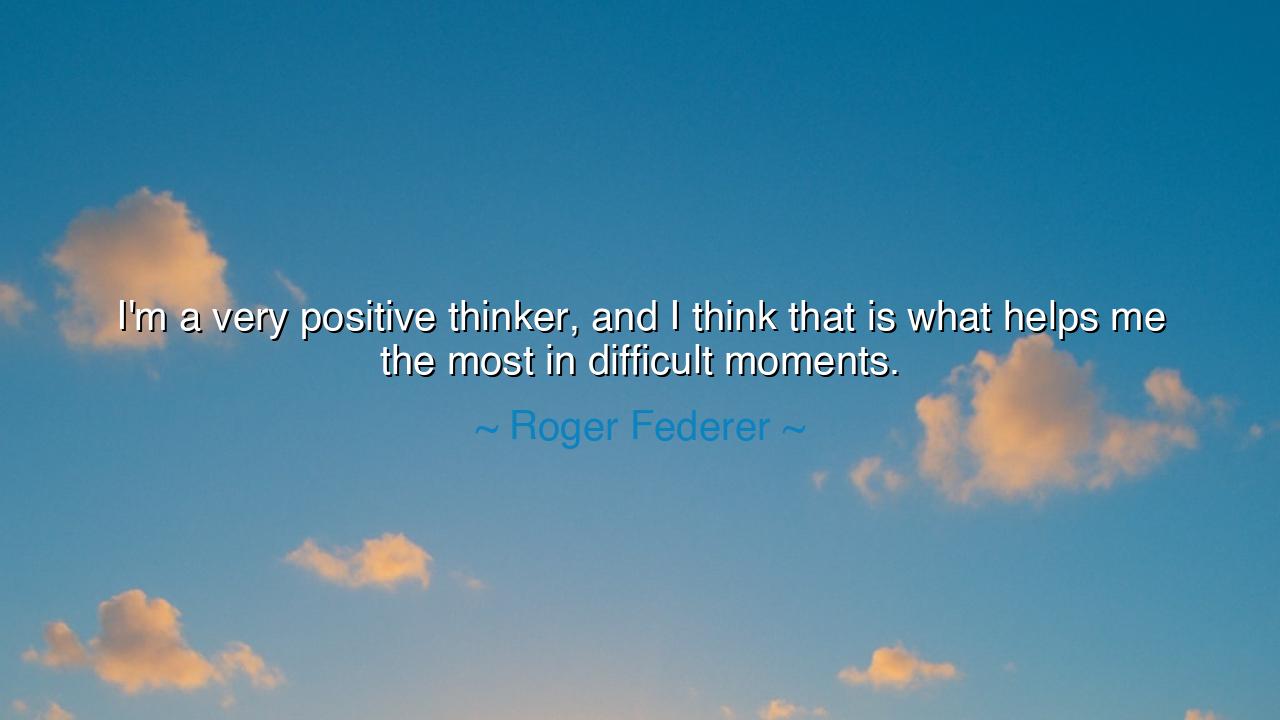
I'm a very positive thinker, and I think that is what helps me
I'm a very positive thinker, and I think that is what helps me the most in difficult moments.






Hear the words of Roger Federer, master of the court, who speaks not only of skill but of spirit: “I’m a very positive thinker, and I think that is what helps me the most in difficult moments.” These words carry the weight of an athlete who has faced the crucible of competition, the roar of crowds, and the silence of doubt. They remind us that victory is not born only from the strength of the body, but from the discipline of the mind. The greatest battles are not waged with rivals but with the whispers within the heart.
To be a positive thinker is to train the mind as one trains the body. It is to choose light when darkness threatens, to believe in possibility even when failure looms. Federer’s wisdom shows us that positivity is not a luxury, but a tool, a weapon of endurance. For when fatigue overwhelms, when mistakes pile high, when the body trembles—only the mind, armed with positivity, can summon the strength to rise again. This is the inner game, the one that decides whether a warrior endures or falls.
The ancients knew this truth. Marcus Aurelius, emperor and philosopher, declared: “The soul becomes dyed with the color of its thoughts.” The Bhagavad Gita teaches that in battle, the warrior must focus not on fear, but on duty and inner strength. Even the psalmist sang of courage in the valley of shadows, proclaiming that faith dispels fear. Federer’s words stand in this lineage: in the difficult moments of life, the mind must be guided by positivity, or it will be swallowed by despair.
History offers us shining testimony. Consider Winston Churchill during the darkest days of the Second World War. Surrounded by enemies and threatened by destruction, he could have yielded to fear. Instead, his speeches ignited hope, not only for Britain but for the entire free world. His relentless positive thinking in the face of near-certain defeat transformed despair into defiance. Like Federer’s teaching, his story reminds us that the way the mind interprets hardship determines whether people collapse or prevail.
Federer’s words also teach humility. For even champions admit to facing difficult moments—injury, failure, doubt. No one escapes them. But the difference between the broken and the triumphant lies in mindset. Negativity paralyzes, magnifies obstacles, and feeds defeat. Positivity clears the vision, sharpens the will, and reveals opportunities hidden within adversity. It is not denial of hardship, but mastery over its power to control us.
The lesson for us is clear: cultivate the habit of positive thinking, not only in times of ease but in the small struggles of each day. For the mind trained in positivity during ordinary trials will stand firm in extraordinary ones. Life will surely bring difficult moments—loss, failure, pain. Yet the one who thinks positively will see not only the hardship, but the hidden doorway to growth, resilience, and eventual triumph.
Practical steps flow from this wisdom. Begin by guarding your thoughts, noticing when negativity arises and deliberately replacing it with hope. In moments of failure, ask yourself what lesson can be drawn. Surround yourself with people who uplift rather than discourage. Speak to yourself with words of encouragement, as a coach would to a beloved athlete. Train the mind daily in gratitude, for gratitude opens the gates of positivity and strengthens the spirit against despair.
So remember Federer’s counsel: “I’m a very positive thinker, and that is what helps me most in difficult moments.” Carry these words as a shield and a compass. For when trials come—and they will—the mind that clings to positivity will endure, rise, and eventually conquer. In this way, you too can meet your battles not with despair, but with calm courage, leaving behind a legacy of hope for those who follow.






PLPhong Le
I appreciate the focus on positivity, yet it makes me curious about practical applications. What specific habits, rituals, or mental exercises help someone remain positive during extremely difficult moments? Can visualization, meditation, or goal-setting play a role in strengthening this mindset? I’d like to explore actionable ways for anyone to build a resilient, optimistic approach to facing life’s challenges, inspired by elite performers like Federer.
THTien Ha
The quote prompts me to consider the role of environment and support in sustaining positivity. Does Federer’s positive thinking thrive because of his team, family, and coaches, or is it entirely internal? I’d like to examine how social and professional networks reinforce or challenge personal optimism, and how others can cultivate a supportive context for maintaining a positive outlook.
TDTung Duong
This perspective emphasizes resilience, but it raises the question: how do positive thinkers handle repeated setbacks or failures? Does positivity help them adapt more quickly, or is it primarily about maintaining confidence and emotional stability? I’d like to explore whether this mindset is more beneficial for performance, mental health, or both, and how it shapes long-term success.
DTDuong Thuy
Reading this, I feel motivated, yet I question the limits of positivity. Can relying heavily on positive thinking ever be counterproductive if it leads to overlooking risks or challenges? I’d like to discuss how optimism can coexist with realism, ensuring that positive thinking provides motivation without ignoring critical details or necessary preparation.
NTNgo Thi Ngoc Tram
This quote is inspiring, but it makes me wonder how one develops such a strong positive mindset, especially in high-pressure situations. Is it a natural trait, or does it come from years of practice and mental conditioning? I’d like to explore techniques that athletes like Federer might use to maintain positivity, and whether these strategies could be applied to everyday challenges outside of professional sports.